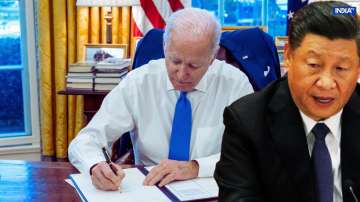In a major blow to the relations between China and the United States, the Biden administration on Wednesday signed a decree, restricting American companies from investing in Beijing, especially advanced computer chips and microelectronics. According to the executive order signed by US President Joe Biden, companies that deal with advanced computer chips, micro electronics, quantum information technologies and artificial intelligence should restrain from investing in China.
According to the statement released by the White House, it said the Biden-Harris Administration is committed to keeping America "safe and defending America’s national security" by protecting technologies that are critical to the next generation of military innovation.
"Biden signed an Executive Order on Addressing United States Investments In Certain National Security Technologies And Products In Countries Of Concern that authorising the Secretary of the Treasury to regulate certain US investments into countries of concern in entities engaged in activities involving sensitive technologies critical to national security in three sectors: semiconductors and microelectronics, quantum information technologies, and artificial intelligence," read the statement.
Hong Kong and the Special Administrative Region of Maca also on the list
Besides China, the President identified the Special Administrative Region of Hong Kong and the Special Administrative Region of Macau, as a country of concern.
Defending the latest order, the Biden administration said it is ready and open for cross-border investment but added it should not pose a threat to national security. The order categorically barred investments in the technological sector that are critical to support their development of military, intelligence, surveillance, and cyber-enabled capabilities that risk US national security.
"Specifically, it will prohibit certain investments in entities that engage in specific activities related to these technology areas that pose the most acute national security risks, and require notification for other sensitive investments," read the order.
China says it will respond
Meanwhile, responding to the recent development, the Chinese Ministry of Commerce, in a statement early Thursday, raised grave concern and said it “reserves the right to take measures.”
"The executive order seriously deviates from the market economy and fair competition principles the United States has always advocated. It affects the normal business decisions of enterprises, disrupts the international economic and trade order and seriously disrupts the security of global industrial and supply chains," it said.
"We hope the US side respects the laws of the market economy and the principle of fair competition, does not artificially obstruct global economic and trade exchanges and cooperation and does not put up obstacles for the recovery and growth of the world economy," it said.
US-China tensions
It is worth mentioning the tension between the two superpowers inflated earlier last year when then-US Speaker Nancy Pelosi visited Taiwan-- a region that China claims is it's own. In fact, China showcased maximum aggression against the visit and even warned of a full-fledged war. Later, tension soared further following the discovery of multiple "Chinese Spy balloons" in the skies of America just days before US State Secretary Antony
Blinken was scheduled to fly to Beijing to cool down the situation.
Although Blinken made a visit in May this year, Biden's tagging his Chinese counterpart Xi Jinping as a "dictator" again fuelled strains.
Also Read: China's economy slips into deflation as consumer prices decline in post-COVID recovery period
Latest World News
